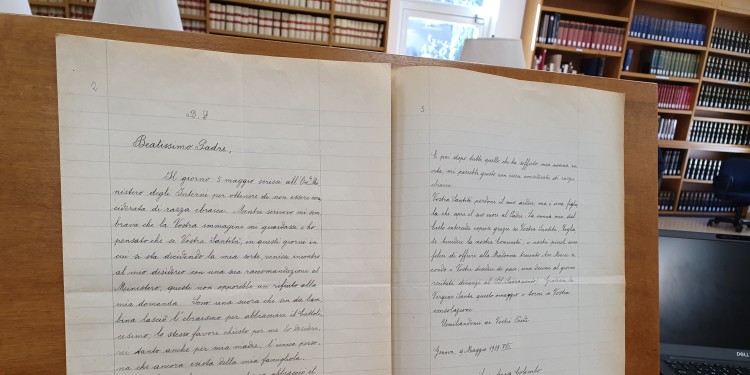
Researchers assess the Vatican’s reactions to petitions from Jews
The team of researchers led by church historian Prof. Hubert Wolf has so far read and analysed only 850 of the approximately 10,000 petitions written by Jewish people and submitted to Pope Pius XII during the Second World War. But initial findings and tendencies identified by the experts, who have been working on the project since October 2021, show that, as project team member Dr. Elisabeth-Marie Richter says, “The Curia certainly didn’t provide standardised responses – despite the large number of petitions. Rather, it dealt with each case individually.” One thing we have to bear in mind, she adds, is that the pleas for help from Jewish people only accounted for about three percent of all petitions which were sent to the Vatican during the Nazi period. This makes it clear, says Richter, how large the number of appeals was which were received by the Holy See at the time.
The researchers also have a clear opinion on the question of the basic stance adopted by the Pope and the Vatican towards these appeals. Project leader Hubert Wolf, who heads the Department of Medieval and Modern Church History at the University of Münster, emphasises that a clear distinction should be made between the political and public level on the one hand and the specific reactions to individual letters on the other. “In public, Pope Pius XII was very restrained in his comments,” says Wolf, “not only for fear of having his comments misused, but also out of concern about strengthening so-called ‘Bolshevism’. With the exception of his Christmas address in 1942, in which he only indirectly criticised the Nazis’ crimes, he remained silent.”
This, Wolf explains, was also a consequence of the fact that in 1917, as Papal Nuntius in Germany during the First World War, he failed in his attempts to launch a peace initiative – which triggered a kind of trauma in him. “On the other hand,” he adds, “in our analysis so far of the petitions and of the responses from the Vatican, we can recognise a surprisingly high degree of willingness to help in the case of every single person – irrespective of whether they were baptised or unbaptised Jews.”
However, it is wrong, he says, to concentrate on the Pope alone in any assessment of the consequences in the Vatican. In Wolf’s opinion it is almost out of the question that there was any written instruction from the Head of the Catholic Church to the Curia or to other relevant persons responsible in the Catholic hierarchy on how such requests were fundamentally to be dealt with. “In the Curia, too, there were people well-disposed towards Jews, as well as such who were antisemitic. But they all had in mind the Church’s mission and duty to help people in need as quickly and as comprehensively as possible – regardless of their nationality or ethnicity. This basic approach of Christian charity can be clearly recognised.”
After around 18 months of working in the archives in Rome, the team has also gained an initial impression of the dimensions of the project. Almost every petition contains references to other letters and documents which the experts have to search out and analyse. As a result, and in addition to the 850 petitions already recorded, the team has collated almost 3,800 further documents.
The team members have so far recorded the names of 2,200 different people in their database. To this end, in 2022 alone they worked through 450 so-called archive boxes in the Apostolic Archive, each box containing up to 1,000 sheets of paper. “From a research point of view, as well as historically, this is an exceptionally important project,” Wolf emphasises. “But it is also a project which will be very time-consuming. It will certainly be running for longer than the ten years projected.”
Author: Norbert Robers
This article first appeared in the University newspaper wissen|leben No. 3, 3. May 2023.
